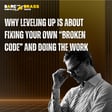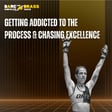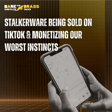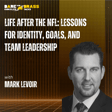Introduction & Market Dynamism
00:00:00
Speaker
What I'm looking for when I hire somebody because of all that is somebody that understands the dynamism of the markets and doesn't come to me with a playbook.
00:00:10
Speaker
um And I think anybody that comes to me with like, you know, so I'm hiring a product market person, product product marketer, and this person's telling me, look, what I'm going to do is I'm going to come in here. I'm going to work with the engineering team. I'm going to work with the co-founders.
00:00:23
Speaker
I'm going to get really, I'm going to get a product instance, and then I'm going to produce X, Y, and Z. are probably going to go another direction because you you're never going to be able to get our CEO or our CTO for more than 10 minutes at any given time in these early stages.
00:00:39
Speaker
Our engineers are going to be so busy, it's going to be hard. I didn't hear you say you're going to hunt for the information, figure it out, work with different teams, pull the customers. I mean, there's a variety of nuance there. So when somebody, cut if I have a demand gen person that throws like, you know, well, this is what I want to do. i want to build this 360 funnel where it's this secular 360 funnel where I have top of funnel with content and advertising and events. And I'm like, I don't want to hear the playbook because this for you, George, on your CISO side, you're going to hate us in about three weeks.
00:01:17
Speaker
Yo, this is your favorite podcast. It's Bare Knuckles and Brass Tax, the cybersecurity podcast that tackles the human side of the industry. i am George K. on the vendor side. And I'm George, a a Chief Information Security Officer.
Critique on Go-to-Market Strategies
00:01:30
Speaker
And today our guest is David Mundy, who is running marketing over at Tuskira. And it's been a while since we've had a marketer, but he had posted recently um about kind of a lack of originality in go-to-market strategies and some of the uphill struggles that both marketing teams face just from a saturated market and some other things. And I thought that was interesting. So had him on the pod. Turns out he's a a listener, which is always nice to hear. um And then, you know, we dropped the usual science. So it was a good it was a good conversation.
00:02:04
Speaker
yeah it was a bit fun because, you know, I think we we both kind of took it as a ah really organic chance to relax because because his energy kind of seemed a lot more aligned with us. And i think in this show, we kind of maybe so we pulled the footy equivalent of dribbling the ball a little bit and had little bit of fun.
Storytelling in Marketing
00:02:23
Speaker
um But, you know, I think David responded well and we really got into, I think, some good sage advice for folks who are, you know, at various points in marketing career early on and just trying to think about storytelling, narrative work, technical work, and and how do you balance all together? i mean, the guy has the experience. He's got the road chops. And, know, I rarely say this about a marketing guy, but he's as real as it gets.
00:02:45
Speaker
Yeah, and we talk about, you know, who would his first hire be? What are the skills he's looking for? um And all of that is great, both for go-to-market teams, but I think his approach is also reflective of a new era that we're in that we affectionately call
SAS 3.0 & Startup Realities
00:03:01
Speaker
SAS 3.0. And so this one is also for the CISOs.
00:03:04
Speaker
So ah let's get into it.
00:03:08
Speaker
David Mundy, welcome to the show. Thank you for having me Absolute pleasure to be here. Big fan of the podcast. I reached out. You had ah a post that we're going to get into in a second, but really it was the train of thought that I was keen on You are on the marketing side, which puts you firmly in the vendor camp. So, George, kick it off as the CISO.
00:03:30
Speaker
Awesome. Thank you there, George. David, pleasure to meet you sir. How are you doing? Hanging in there. Tired, exhausted. You know the startup life, but hanging in there for sure. Yeah, i feel you, man. CISO life is ah kind of a, it's a dryer, just a different type.
00:03:47
Speaker
I'm complaining to the wrong person, let me tell you. I know that. No, no, no. Startup life is like a closet full of hats. You don't know what roles you're playing that day. I got nothing but love for you, man. a Amen. a Amen indeed.
00:04:00
Speaker
So I had a chance to kind of read up about you a little bit because, ah you know, sometimes when George pulls into his massive network, of the listeners or some of the cell folks, like I've never met him. Like I'm still a weird little squirrely practitioner.
00:04:12
Speaker
So You've had a really awesome and interesting career in marketing. I like that you've worked your way from the ground up to like conclusive roles in leadership now. And I think you have enough perspective because, you know, you go back all the way like 2010, you know, you've seen the generations of the last 15 years now.
00:04:31
Speaker
And you know that there is endemic problem in terms of the methodology that go to market and sales narratives are being built around the SAS 2.0 approach, which I don't know about you. Last I checked my calendar, it's not 2015 anymore.
00:04:45
Speaker
So I need to understand, you know, based on your experience and your perspective, how do we break these asinine, archaic go to market strategies of the past generation?
Community Building & Networking
00:04:58
Speaker
And how do we turn it into an industry wide narrative that we need to bring the stories to market better, in your opinion? Yeah. um Hey, great, great questions.
00:05:11
Speaker
And probably a lot to say here that we don't have enough time for. i mean, I think first I'll start off not countering that, but I think a lot of things, especially in go-to-market are cyclical.
00:05:25
Speaker
um I think you've seen that in over the last like 15 or so years with sales specifically, i think I'm going to get to direct answer of your questions, but I'm going to, going to walk through there a bit with context. yeah a man you you got all night brother go for it I think what we, what I've seen in my career anyway, and I've been in marketing for 20 plus years, a little bit before college and afterwards, but I saw an over index on marketing on the digital side that kind of pushed the sales expertise to the back.
00:06:00
Speaker
And we started over indexing on digital leads. um Marketing became really important in the demand gen aspect or let's say the lead gen aspect and providing value in that capacity.
00:06:13
Speaker
i think it's. made the sales organizations or maybe it made the founders or the hiring managers of salespeople less reliant on them becoming hunters or relationship builders.
00:06:28
Speaker
And it turned everything more digital. Right. And I think to a detriment for sure, because from that wave, not directly, but as a piece from that wave, you got
00:06:39
Speaker
over inundation of and saturation actually of marketing messages, right? Advertising went nuts, white papers everywhere. Everybody has a blog. um I still remember when those are relatively rare, um you know, and messages started to convolute and the strategy went completely digital.
00:06:59
Speaker
How we break out of that, I think, and why I said it's more cyclical nature is because now we're stepping back more and kind of to the 90s sales methodology, maybe the early aughts, but the 90s sales methodology, where I think, and I think a lot of people agree with this, I think more in-person,
00:07:15
Speaker
face-to-face, figuring out ways to get your SMEs and your salespeople in front of the end user to kind of cut through the noise. Basically, I think the ways of organic marketing, and I'm not saying they're done or dead.
00:07:30
Speaker
I also dislike that, the the approaches that people take when they say anything's dead, because again, I think it's cyclical. But I think right now what we're seeing And you know what, Cyberstarts has had, interestingly enough, that VC and all of their success that they've had with the companies has kind of led the way over the last four or five years with this community and network building, which has spawned a variety of companies and given them more power and more startups reaching out to them. So how we cut through that 2015 digital by...
00:08:02
Speaker
ah ah me i would say is by
00:08:08
Speaker
companies creating environments where they can be in front of their end user and their icp and then work in collaboration with parties or with uh third parties with partners uh and whomever that can extend that company's value and trust into their networks and then bring them together one it'll help it'll help get rid of the the nonsensical meetings, right, with the vendor and the end user, but two, it'll help fast forward and facilitate and cut through all of the jargon, the analyst acronyms and the marketing fluff, so to speak, and help us get right to the point.
00:08:50
Speaker
Nice. I dig that. I'm... Had moments of both PTSD and nostalgia as you walk down digital marketing lane.
Digital Marketing Challenges
00:08:59
Speaker
I definitely take your point there and over indexing on the digital and for our listeners, all the things that we take for granted, like content syndication and these pay for play awards and marketing.
00:09:11
Speaker
Everyone wants a quote unquote content marketer, like even the word content, right? It became commodified because it was ah SEO and we just needed shit on the website. was like, I don't Before it was like the early blogs were just SMEs kind of jamming in their own chamber because they thought they had something to share. And then everyone was like, ah, just write stuff for Google. yeah.
00:09:32
Speaker
um Yeah, that's the whole apparatus became a way to automate dumb shit faster. Like, at you know, 100%. So um but I want to circle back to something you said at the beginning, which was the skills.
00:09:49
Speaker
Right. You said that over everything. indexing created this atmosphere where when we started searching for sales, it wasn't so much hunters as it was like, can you take this lead file?
00:10:02
Speaker
Can you sort of like winnow it down? Can you automate it? Can you dump it into outreach sales loft, whatever? So it was more like kind of like I need a person at the end of the conveyor belt rather than someone who either has technical expertise, as George has complained about a lot, or can even like maintain a lot of contacts, I think in sales in some ways, like public diplomacy, right? You're sort of constantly maintaining these relationships and touching base.
00:10:29
Speaker
Do you think um I bring this up because in the post that sort of inspired me to reach out to you, um you brought up this idea that there's a double edged sword to expertise, which is something that I'm a big fan of this idea that like,
00:10:44
Speaker
you can lean so much on expertise that it becomes a weakness, right? And you point out accurately that novice, I think novice accountants, I've even said like undergraduate finance students are better able to spot embezzlement than CFOs. It's because they don't have...
00:11:02
Speaker
this pattern recognition that they're leaning on, they're sort of exercising new skills. So I want to give you some time to talk about like, what are the skills that you're looking for in the marketers that
Market Intuition & Strategy
00:11:12
Speaker
you're hiring? Or do you think is also required of just go to market teams generally as, as we're trying to stand out in a market that is actually not so crowded, but sometimes feels overwhelmingly saturated.
00:11:26
Speaker
Yeah, ah man. Got ah great questions again. One of the reasons I'll start, I'll give you one of the reasons I like your guys' podcast is because the variety of people you have on rights, which is why we spoke earlier. And I was like, man, you're, you're, you're hitting the low bar with me. I apologize. But, uh,
00:11:44
Speaker
but I like it because it gives a whole bevy of different perspectives. Right. And you know, you have the marketing folks in there, some of the sales, you have the CTOs in there, right. Founder here and there. And it's, it gives a a bunch of awesome perspectives.
00:11:56
Speaker
If I step back to that post where you and I first started, uh, uh, speaking,
00:12:06
Speaker
I wonder, especially me having done this for 20 years, at what point do I get caught in that, um, in that this is how I've done it in the past so it's going to work again and I perpetuate it. I mean, no matter how hard I try, i think the double-edged sword of that specific point is how hard do we try on the go-to-market side, not just marketing, not to sales, but go-to-marketing side, founders, everybody to be unique in that as well. And then we spend all this time over-indexing on uniqueness. We forget to do the basics of which some are still important, right? You still need a website right now.
00:12:43
Speaker
um You still need messaging, still need positioning, still need product market fit, right? You still need to get customers. You still need to work with those customers. And you still need to pull all the information you can from those customers, design partners, et cetera.
00:12:56
Speaker
um I will say, I don't believe anybody has the answers, no matter how many no matter how many people think they do, even through some relative success I have, I don't think I have any of the answers. And I think every place I've worked has been such a dynamic shift and such a difference for a variety of reasons, right?
00:13:18
Speaker
Who are the founders? What's the budget look like? How much funding did we get? What's the market? What's our specific ICP? We can all say default to say the CISO, and we can all default to say financial and healthcare care companies, right? Everyone builds software only for enterprise. Yeah. It took me, ah you know, when I was at Divi Cloud, which is phase one cloud security company, you know, when we saw Wiz and Orca there in the distance. um But it was a little bit easier to get to, you know, cloud security architects were relatively new and in in profession there, get to the CISO. Nowadays,
00:13:55
Speaker
you want to talk to a CISO at a fortune 500,000 company and you're a series A seed, even series B company. Good luck. Right. I hope you have cyber starts Sequoia money behind you. Right. To be able to eventually get there.
00:14:09
Speaker
What I'm looking for when I hire somebody because of all that. And like, if somebody that understands the dynamism of the markets and doesn't come to me with a playbook.
00:14:21
Speaker
um And I think anybody that comes to me with like, you know, if I'm hiring a product market person, product product marketer, and this person's telling me, look, what I'm going to do is I'm going to come in here. I'm gonna work with the engineering team. I'm going to work with the co-founders.
00:14:34
Speaker
I'm going to get really, i'm going to get a product instance, and then I'm going to produce X, Y, and Z. are probably gonna go another direction because you you're never gonna be able to get our CEO or our CTO for more than 10 minutes at any given time in these early stages.
00:14:50
Speaker
Our engineers are gonna be so busy, it's gonna be hard. I didn't hear you say you're gonna hunt for the information, figure it out, work with different teams, pull the customers. I mean, there's a variety of nuance there. So when somebody, cut if I have a demand gen person that throws like, you know, well, this is what I want to do. i want to build this 360 funnel where it's this secular 360 funnel where I have top of funnel with content and advertising and events. And I'm like,
00:15:13
Speaker
I don't want to hear the playbook because this for you, George, on your CISO side, you're going to hate us in about three weeks. um So people that understand and there are a lot of very, very brilliant young professionals that I've had the pleasure of working with that I still hire into companies this day that blow me away because they get it.
00:15:34
Speaker
and they get it intuitively. um And that kind of fresh mindset of, you know, this is what the market needs. We need to build a community based on this. We understand a lot of security leaders want, don't have necessarily a soapbox. It's just an instance
Growth Expectations & Sales Expertise
00:15:49
Speaker
to get their message and their opinion and their thoughts out. so we should build a community. We should get some of our advisory board on there and build. This is what we did when I worked at DeSera and it was on the backs of very young minds, young, brilliant minds, young relatives to me.
00:16:02
Speaker
that created strategies like that, that ultimately led to pipeline, that ultimately led to customers because they helped us build trust. End of the day, all I'm doing is building trust in my brand and then ultimately trying to quantify that trust in the pipeline for sales, right? And help them build a pipeline off of that trust.
00:16:19
Speaker
The ways to do that shifts continuously year by year now. I think there is a ah bit of a problem, a massive, massive problem, because a lot of the private equity type forces and VC type forces that are funding and backing a lot of these startups, particularly on the OEM side, right?
00:16:44
Speaker
They are driving, in my opinion, oftentimes extremely unrealistic growth numbers and are making haphazard quota and personnel decisions as a result of that.
00:16:58
Speaker
And you know yeah that's that's my objective opinion as a CISO and as a guy running this show with one of the top sellers in the industry today. Like George understands the game and we see this shit.
00:17:10
Speaker
So one, how do you how do you assess that statement as well based on what you're seeing as a marketing leader today? And the other question just lead into it, how important is it in this generation as a seller to be a little bit technical.
00:17:27
Speaker
Yeah, great questions. Let me answer the first question if I got it correct. And just to kind of dumb it down for myself. Basically, it sounds like you're seeing a lot of VCs, PEs fund these companies with outrageous expectations and goals. And i think this touches on some things that I've been talking about with every category of cybersecurity. You'll have the pattern breaker, so to speak, right? You'll have the, the,
00:17:59
Speaker
company or kind first couple companies that will create this relatively ingenious idea, right? This this new product and then 40 products and 40 companies will be right on the back burner with the exact same idea, with the same content, same messaging.
00:18:12
Speaker
And then it gets so convoluted as to who came up with it first. It's usually the more well-funded companies tend to dominate. The ones with the better network, the ones there, right? um I think bleeds into answering your ah second question is, yeah, I think sellers have to be
00:18:30
Speaker
One, the best sellers that I have had a fortunate, uh, the, the, the fortune to work with, you know, some, uh, uh, name drop them. Chris Hertz, who's now a CEO at Healer, which is the AppSec company. He was like my mentor, a CRO at DiviCloud.
00:18:44
Speaker
Dave McCaw, who I think you guys are familiar with, uh, great, great network community guy, very super technical. Um, I 100% think that the more technically... Same thing with marketing folks as well, right? Marketers that don't know the product are never going to succeed in cybersecurity in today's arena.
00:19:04
Speaker
Don't know the competitor's product, don't know the CISO's pain, don't know how the product relates to their value. But sales and sellers, more importantly, because they have to be able to speak that language. And I think it's underestimated how hard the seller's job has gotten.
00:19:18
Speaker
and and just how hard it's become, right? I mean, they have to translate signals internally and work with the SEs and work with the product people, be able to translate that into, translate usually the jargon, it's not just marketing's fault, right? Founders, engineers, everybody, they have to translate that into and actual communication with the end user in a way that resonates. And oftentimes, even though they have help, they're doing that so much that they're often doing that ahead of the pack.
00:19:52
Speaker
So they're having to match the product value with the CISOs pain point. And then they're having to have having to have those deep technical discussions, especially when an SE can't be present when you're in a younger organization and you only have one SE for maybe two or three sellers and and the time isn't just there.
00:20:10
Speaker
So I think for a seller, the most important thing, at least where I've seen a lot of success as one of the most intimate um understandings of the product in the company holistically, right? As it plays both internally and then externally, right? You might have the CTO, the engineers, the the CEO, who have a very intimate understanding of the product as it as it as it's its build and its function.
00:20:34
Speaker
But the seller, especially your first one our organization will have to understand all of that to a degree, but then how that plays externally with the end users and how to translate that into value on the outside.
Sales-Marketing Integration
00:20:46
Speaker
And then bring all of that information back internally. So the product team can get back to an engineering team so they can build. So the marketing can build content based and in any kind of function or strategy based upon what the seller's hearing.
00:20:58
Speaker
So I think we are coming into a time where underappreciated, which is funny hearing a marketing person compliment sellers so much. throughout last for me the che essence is This has been a change over the last 20 years.
00:21:10
Speaker
But I mean, ah yeah you know, from a marketing perspective, if you're not completely in sync with the sales team, you're I don't know what you're doing. um And, you know, I do think sellers probably have one of the hardest ah One of the hardest jobs in go to market right now due to the inundation, due to the complexity and rising above the noise, due to marketing in a holistically in an arena where marketing as departments are trying to figure it out right now because the landscape is shifting. And then due to the fact that, you know, there's 47 founders for every Gardner acronym you can name.
00:21:49
Speaker
Yeah, I agree. I mean, I think if you were to ask ah any early stage company, you should be able to pick somebody out of marketing at random and ask them, how is this product onboarded and implemented. And if they're like AI, then get out, you know, like they can't tell you, you know, it's an API. If they just say, well, like, well, you'll work with our customer success team. Like if they can't tell you that it's a huge problem because at that stage, like everyone should know how the basics of the product are working.
00:22:20
Speaker
especially in the, you know, I actually even get it when you're in the larger companies, right? the The midsize or publicly traded company is not having all the marketing people have a fully intimate understanding of the product portfolio. But yeah, i agree in the seed series A, B rounds of the companies, which is particularly my experience. Yes. Most everybody on the GTM side, all the way down to the SDR should have a very intimate understanding of the, of the product.
00:22:51
Speaker
um Hey listeners, it's Pride Month and that means the annual fundraiser is back. In the month of June, all profits from all sales of Pride merch in the BKBT swag shop are donated to scholarships for students in cybersecurity, both undergrad and graduate studies.
00:23:11
Speaker
We have a whole bunch new swag. So check it out at bkbtpodcast.shop and check out the Pride and Cyber collection. Anything you buy there, we're donating profits from.
00:23:23
Speaker
And this year, we have corporate sponsors who will be matching our donation. So let's see how much we can raise. Thank you for your support. And thank you for listening.
Founder Expectations & Internal Challenges
00:23:41
Speaker
When you're thinking about the interplay of brand and I guess for lack of a better term lead generation or working with a sales team, um,
00:23:55
Speaker
Talk a little bit about how you're managing up, because one of the things that George and I have pointed out is, like you said, sometimes founders, they're great. They're technical, they're engineers, they saw a problem, they had the hubris to try and build something to address the problem.
00:24:12
Speaker
And then it kind of feels like somebody's whispering in their ear about like, oh, you should go hire this person because he did this thing at this thing. And you just repeat that. Right. Like it's again, the problem, it's not 2015. It's not 2018. It's not 2020. A lot changes. Yeah.
00:24:25
Speaker
a lot changes And so I find that sometimes when I go to a marketing conference, people are saying what we are saying and everyone is nodding. And I'm like, no, no, the CMOs all get that is 2025.
00:24:39
Speaker
But what they're working with is a founder who thinks they're in 2016 because somebody, whether it's a VC or a close friend, is just whispering in their ear. Right. So how are you managing that?
00:24:50
Speaker
expectations up to to educate founders like, look, this is the way the market was when you were working at X, Y, and Z. And now that you have founded this, something has changed. Like, how are you having those conversations?
00:25:01
Speaker
Yeah, man. Great, great, great question. um And I think, again, when I read these posts that blame marketing for every problem under the sun, um I feel like most of the marketing peers that I have From people I've worked with, people I'm friends with, unfortunately, people in competitive companies get it right. They fully understand the whole environment. I don't see a lot of what they create being jargony. I see a lot of and I hear a lot of them internal issues being the biggest ah barriers to.
00:25:37
Speaker
Let's say marketing success, yeah not overall organization, marketing success. And, you know the good analogy of it is, and ah ah George, correct me if I'm wrong, but when I was DiviCloud, a big part of our strategy was helping our security leader or CISO,
00:25:57
Speaker
let's say network some customers some not get seats at the table like we built i'll say campaigns for lack of a better word but it was a more of a holistic strategy than just dumbing it down to a campaign but we built strategies to help and reports and dashboards and all of that fun stuff from a cloud uh posture management perspective to help cso's get a seat at the table and that was a lot of the pain we had and it seems in that that right cso's need the power to be able to make cybersecurity decisions organizationally, because most of the organization doesn't fully understand the problems that the organization is facing, right?
00:26:36
Speaker
Marketing has been in that same boat forever. We get blamed for a lot of the jargon and the fun issues and a bunch of the other stuff. We have very minimal power within the organization, right? So when you talk about managing it up, managing up, I do feel like ah probably 30% of my job is convincing people in the organization with data often, right?
00:27:04
Speaker
um Of, what we can can't do positioning messaging man messaging is especially in the early companies is like 50 of my job now yes um when day it used to be but it is now uh and just constant changing not for example right um let's not do exactly what our competitors are doing because they're announcing that they have two million in arr you know subtly right maybe we don't let's not do that let's not base everything on Gartner saying preemptive security is going to be the next big thing by 2030. Right.
00:27:37
Speaker
right um It's tough. It's tough. In this company, Tuskira, for instance, I worked with Piyush, Ohm, and Vipul at Accurix, which eventually became Tenable. I was acquired by Tenable.
00:27:51
Speaker
So I have a bit and more, I have ah a bit better repertoire with them. So we have just a ability to be frank and blunt and argue and debate and move forward.
00:28:03
Speaker
But even then it's still complex because i don't think anybody has the right answer. There really is no way to say this is right or wrong until customers start coming in. And that is ultimately the end validation point. So yeah I don't have a defined answer for you other than open dialogue, open communication, as many feedback loops as possible.
00:28:22
Speaker
as much data as possible when it comes to trying to validate any point you need to make. um And usually that might be third parties. Usually that might be showing that episode of your podcast where you're talking to specific people that are talking about this issue.
00:28:39
Speaker
But I don't think there's any defined answer I think it changes with the founders as in my experience, being able to manage up or not being able to manage up has changed based upon the environment and the people that I have that I've worked with.
00:28:53
Speaker
So let me ask you this, David. Would you say, and this is just a leading question, but would you say that you're a good storyteller? Like if you're hanging out with your friends and it's ah it's ah's a, it's a, know, you're out by the fire, you know, you're sharing cups, that kind of thing.
00:29:08
Speaker
Can you, can you regale everyone with a good story and capture their attention? I'm not a center of attention kind of guy, but yeah, I feel like I can do ah a pretty good job of getting a laugh here and there telling an entertaining story once in a while.
00:29:22
Speaker
Yeah. Tell me this then. how How important is it in your professional opinion as a career marketer? Is it to develop and hone your fundamental storytelling capability as a marketer?
00:29:38
Speaker
Let me ask, can i reverse it? Can I answer that question with a question real fast? Let's answer, yeah. As a security leader, right, and security expert, how ah how often are you reading anything that people of my ilk are producing?
00:29:54
Speaker
That have to or that I want to.
00:29:58
Speaker
Let's say let's say lee on leisure leisurely. i read a couple Usually a couple weeks, at least. Okay, that's that's actually a lot better than than most of what i most of what people tell me. um So that's good.
00:30:11
Speaker
So... I will say that's a bit of a problem for people that have, you know, the the relationships with with the network that they're selling into is that you have an understanding that a lot of people aren't reading what you're putting down.
00:30:24
Speaker
And I only say that because the investment in that time, as in any strategy, when it's not being consumed by you know the target, then you tend to lessen the quality, right? And then you have a lot of marketing people saying, thank God for ChatGPT, Brock, you know ah Gemini and all that. And that's where I think that lesser quality content comes from.
00:30:46
Speaker
Now, to answer your question, it is of the utmost importance. You have to be able to translate
00:30:54
Speaker
what your team has built into the market and you have to use the various signals to be able to create that story right ideally customers analysts media competitors um you know general conversations events are really good for that more intimate events where you can have conversations and you take all of that feedback and you put it into you know let's just call it like your company's brain and then you build story off of that
00:31:25
Speaker
And then you have to be able to do it relatively quick because you have to try to control the narrative as well. So it has to be good storytelling and you have to try to control the narrative in whatever way.
00:31:41
Speaker
I'm go to say category for lack of a better word, but in whatever category your company is bringing value into in order to help your the security leader, the stock manager, the security engineer, whomever your your ICP is in that regard.
00:31:57
Speaker
But again, long-winded, verbose, overly verbose, I apologize, way to answer. Probably one of the most important skills across marketing in general, but sales too, right? I mean, sellers, SDRs, everybody has to be among the best storytellers and it might not be uh you know uh beginning middle ends but they have to be able to translate what their founders and what the engineers are building into something that can be easily digestible uh and and intriguing and engaging and hits the pain points of their uh buyer road wisdom yeah that was that was a good question i was intrigued to see where that was going
00:32:38
Speaker
um All right, David.
Hiring Strategy & Team Roles
00:32:39
Speaker
So let's say you have, uh, you know ah Seed company have come out of stealth. They're giving you like carte blanche. They've got some insane funding.
00:32:52
Speaker
So you have a relatively strong budget for a seed company. um Tell me about your first marketing hires who, who like you're not coming in and there's a director of marketing there and you're sort of supplanting them like from scratch. Like who do you want to hire first and why? Yeah.
00:33:10
Speaker
I actually avoid, have avoid, typically avoided all of those companies when they have someone to supplant or when they have somebody of leadership ilk that's there, especially at a startup, it's just bad.
00:33:21
Speaker
You know, somebody director, eventually they want to be the VP or CMO of somebody that ever a CMO at a startup, then that's just not, ah it's just generally not a good environment. But I've worked with my colleague, and this might be a cheap answer, but I've worked with my colleague, Jackie, for roughly 10 years, even out before the cybersecurity industry. 10, 11 years.
00:33:45
Speaker
um ten eleven years um She's always the person I beg to come with me on these journeys. And she's been through the, you know, company's acquisitions and she's with me again at Tuskegee.
00:33:59
Speaker
um I tend to hire people that I've worked with in the past. And there's not a lot, ah like just say out of like, Six hires that I'll have, probably only two will be new.
00:34:12
Speaker
And then again, it'll come recommended through people that I know through network, through um security leaders or buyers that that appreciated that person. And that's generally how I i tend to hire. And one those what are those roles like in order?
00:34:27
Speaker
Yeah. so first one for me, uh, actually kind of branching off the storytelling is would be Jackie's role, which is, uh, mark marketing communications, right? I need somebody that knows the media space very well. I need somebody that knows the analyst space very well. I need somebody that can build a brand very well and build messaging behind that. And I need somebody that can build community very well.
00:34:51
Speaker
But I don't need those for the sake of having those in siloed compartments. I need somebody that understands how to translate that into quantifiable metrics that we can use to bring customers into the pipeline.
00:35:05
Speaker
I hear a lot of talk nowadays about marketing's job is not to build a pipeline or to build customers. I strongly disagree with that.
00:35:15
Speaker
I don't think that's the only job we have. yeah I think there's a variety of jobs we have, but I think if we are not aiding the sellers and building pipeline, across the board, whether that's us bringing in meetings and leads on occasion or making sure that they have collateral through every step of, you from data or just brand to air cover. Cause when they say I'm from XYZ company, they're like, who? parents like So my goal is to make sure that a company has heard of us before we get to them.
00:35:47
Speaker
oh And Jack and Jackie is one of the best that I have ever worked with at doing that. Um, Doing that in seed to startups and understands how complex and complicated the market has become because we've grown into it.
00:36:02
Speaker
And she's somebody that I know that can help me slice through that and build strategy as it applies to our narrow ICP. And as we spread out, um, next person I next, oh, sorry. Next person I hired there will be an SDR.
00:36:16
Speaker
Um, and the Eric, sorry, next person I hired there will be an events manager to work under Jackie because, I do believe in not necessarily the trade shows, though I think they have their importance and we can spend hours talking about that.
00:36:30
Speaker
I've been in a thousand debates about that, but more of the smaller events, anything from a dinner somewhere locally helping our seller builds events in various regions to the various cyber risk alliance or cybersecurity events, confide event, anything like that, right? That can help us set up ah to be successful in any of these avenues.
00:36:51
Speaker
After that, it would be an SDR because i mean the most natural land bridge from marketing to sales is having that SDR, in my opinion, who works under the marketing umbrella, but works directly with the sales organization.
00:37:05
Speaker
and Now they're giving us the natural feedback loop, and then they're getting everything that we're producing from a product marketing, from a marketing, and they're able to combine that into really good threat... or we Sorry, was going say threat and tell. Really good external intel um when they go and make their cold calls, when they're qualifying any of the warm stuff that's coming in, and then working with sales on breaking into their targeted accounts, et cetera.
00:37:31
Speaker
I like this idea of of the feedback loop. I'm big on the feedback loop. i i've always I'm sort of like tilting these days to like, Maybe customer access is first to translate the messaging from the design partners who convert into customers. But yes, and I think we're on the same page in terms of messaging.
00:37:48
Speaker
um i go back and forth, ask me in a different month whether I think SDR should be under marketing. It sort of changes. But I also think for George's sake, you know, my justification for that is like,
00:38:01
Speaker
if, if he's never heard of you and his first contact with your brand is somebody who is completely divorced, like it's an outsourced agency, just calling with a script.
00:38:12
Speaker
yeah I think that that must just be hell on earth for a marketer. You could build all the brand equity in the world. And then this person's just a turd sending, you know, 60 automated email messages a month to George. And he's gonna like, I hate this company. I'm never working with them ever.
00:38:30
Speaker
but i have I've been fortunate. I've worked with such good SDRs. um ah like some of the SDRs I work with, Laura, who has worked with me across a couple of companies now will tell me point blank, you know, the shit you're sending. out Sorry. from i'm not I don't know if I'm like a customer. There it is. She's like, the shit the shit you're sending out is terrible.
00:38:49
Speaker
ah We need to stop this. And be and whatever it is, right. Whether it's an email, a blog post, a campaign, a white paper, anything. She goes, it's not going to resonate. Let me explain you why.
00:38:59
Speaker
like if um that if i That is a SDR of gold that you got there. Yeah, but it's a lot for a lot of them. I have worked with fortunately and we've hired in again, credit to my, you know, Chris Hertz, who is the CR was my mentor who kind of walked me through the process. was very keen on SDRs being their own organization and the importance there. But um to your point, the feedback loop of somebody who's kind of almost on the front lines, like a precipice of the front lines, being able to deal with sales on a daily basis who are on the front lines and then bringing that back continuously into the marketing channel, into the organization itself becomes a pretty vital ah for success, in my opinion.
Conclusion & Call to Action
00:39:41
Speaker
Nice. All right, David. Well, thank you for taking the time and for being willing to sit in the hot seat after after I reached out really randomly. Yeah, no, I appreciate it. It's honor to be on here with you guys. Again, I very much enjoy the podcast and I've shared a variety of episodes internally. So my company has become very familiar with you guys as well. Nice. Appreciate Keep pretty serious keep on keep on doing the good work ah for the ah community, you know?
00:40:07
Speaker
Thanks for hanging out, man. All right. Well, we hope to run into you soon. Absolutely, man. I appreciate you guys. Thank you so much. Take care.
00:40:16
Speaker
If you like this conversation, share it with friends and subscribe wherever you get your podcasts for a weekly ballistic payload of snark, insights, and laughs. New episodes of Bare Knuckles and Brass Tacks drop every Monday.
00:40:30
Speaker
If you're already subscribed, thank you for your support and your swagger. Please consider leaving a rating or a review. It helps others find the show. We'll catch you next week, but until then, stay real.




















